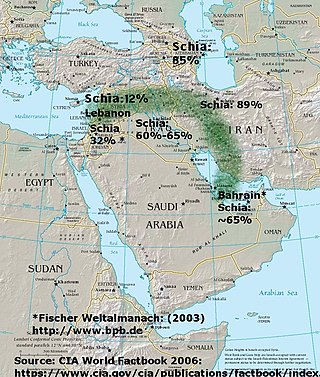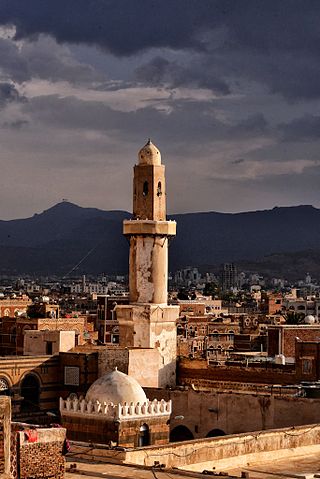
The United Arab Emirates (UAE), or simply the Emirates, is a country in West Asia, in the Middle East. Located at the eastern end of the Arabian Peninsula, it shares borders with Oman and Saudi Arabia; as well as maritime borders in the Persian Gulf with Qatar and Iran. The United Arab Emirates is an elective monarchy formed from a federation of seven emirates. As of 2023, the UAE has an estimated population of 9.97 million. Emirati citizens are estimated to form 11.6% of the population; the remaining residents are expatriates, the majority of whom are South Asian. Islam is the official religion and Arabic is the official language. Abu Dhabi is the country's capital, while Dubai, the most populous city, is an international hub.

The Kingdom of Saudi Arabia is an Islamic absolute monarchy in which Sunni Islam is the official state religion based on firm Sharia law. Non-Muslims must practice their religion in private and are vulnerable to discrimination and arrest. While no law requires all citizens to be Muslim, non-Muslim foreigners attempting to acquire Saudi Arabian nationality must convert to Islam. Children born to Muslim fathers are by law deemed Muslim.
Religious discrimination is treating a person or group differently because of the particular beliefs which they hold about a religion. This includes instances when adherents of different religions, denominations or non-religions are treated unequally due to their particular beliefs, either by the law or in institutional settings, such as employment or housing.

Islam is the official religion of the United Arab Emirates. Of the total population, 76.9% are Muslims as of a 2010 estimate by the Pew Research Center. Although no official statistics are available for the breakdown between Sunni and Shia Muslims among noncitizen residents, media estimates suggest less than 20 percent of the noncitizen Muslim population are Shia.
Apostasy in Islam is commonly defined as the abandonment of Islam by a Muslim, in thought, word, or through deed. It includes not only explicit renunciations of the Islamic faith by converting to another religion or abandoning religion, but also blasphemy or heresy by those who consider themselves Muslims, through any action or utterance which implies unbelief, including those who deny a "fundamental tenet or creed" of Islam, An apostate from Islam is known as a murtadd (مرتدّ).
Human Rights in the UAE are substantially restricted. The UAE does not have democratically elected institutions and citizens don't have the right to change their government or form political parties. Activists and academics who criticize the government are detained and imprisoned, and their families are often harassed by the state security apparatus. There are reports of forced disappearances of foreign nationals and Emirati citizens, who have been abducted, detained and tortured in undisclosed locations, and denied the right to a speedy trial and access to counsel during investigations by the UAE government. Human Rights Watch states that Emirati laws maintain capital punishment and discriminate against women, migrants and LGBT individuals.

The Shia Crescent is the notionally crescent-shaped region of the Middle East where the majority population is Shia or where there is a strong Shia minority in the population.
Islam is historically divided into two major sects, Sunni and Shia Islam, each with its own sub-sects. Large numbers of Shia Arab Muslims live in some Arab countries including Lebanon, Yemen, Bahrain, Iraq, Saudi Arabia, Kuwait, Oman, the UAE, and Qatar.

Human rights in Dubai are based on the Constitution and enacted law, which promise equitable treatment of all people, regardless of race, nationality or social status, per Article 25 of the Constitution of the United Arab Emirates. Despite this, Freedom House has stated: "Extreme forms of self-censorship are widely practiced, particularly regarding issues such as local politics, culture, religion, or any other subject the government deems politically or culturally sensitive. The Dubai Media Free Zone (DMFZ), an area in which foreign media outlets produce print and broadcast material intended for foreign audiences, is the only arena where the press operates with relative freedom."

Yemen is an Islamic society. Nearly all Yemenis are Muslims, with approximately 60% belonging to Sunni Islam and 40% belonging to Shia Islam (Zaidi). Amongst the native population, there were approximately 1,000 Christians, and 6 remaining Jews in 2016. However, Pew-Templeton estimates the number of Christians to be as high as 40,000, though most do not publicly identify as such, due to fears of religious persecution. According to WIN/Gallup International polls, Yemen has the most religious population among Arab countries and it is one of the most religious populations world-wide.
The use of politically and religiously-motivated violence dates back to the early history of Islam. Islam has its origins in the behavior, sayings, and rulings of the Islamic prophet Muhammad, his companions, and the first caliphs in the 7th, 8th, and 9th centuries CE. Mainstream Islamic law stipulates detailed regulations for the use of violence, including corporal and capital punishment, as well as regulations on how, when, and whom to wage war against.
Islam is the majority and official religion in the United Arab Emirates, professed by approximately 76% of the population.The Al Nahyan and Al Maktoum ruling families adhere to Sunni Islam of Maliki school of jurisprudence. Many followers Hanbali school of Sunni Islam are found in Sharjah, Umm al-Quwain, Ras al-Khaimah and Ajman. Their followers include the Al Qasimi ruling family. Other religions represented in the country including Christianity, Hinduism, Buddhism, Zoroastrians, Druze, Baha'i, Judaism, and Sikhism are practiced by non-nationals.

Islam in Lebanon has a long and continuous history. According to an estimate by the CIA, it is followed by 63% of the country's total population. Sunnis make up 31.9%, Twelver Shia make up 31.2%, next to smaller percentages of other Shia branches, such as Alawites and Ismailis. The Druze community is designated as one of the five Lebanese Muslim communities, even though most Druze do not identify as Muslims, and they do not accept the five pillars of Islam.
Capital punishment is a legal penalty in the United Arab Emirates.
Sharia means Islamic law based on age-old concepts. Since the early Islamic states of the eighth and ninth centuries, Sharia always existed alongside other normative systems.
The legal system in the United Arab Emirates is based on civil law, and Sharia law in the personal status matters of Muslims and blood money compensation. Personal status matters of non-Muslims are based on civil law. The UAE constitution established a federal court system and allows all emirates to establish local courts systems. The emirates of Abu Dhabi, Dubai and Ras Al Khaimah have local court systems, while other emirates follow the federal court system. Some financial free trade zones in Abu Dhabi and Dubai have their own legal and court systems based on English common law; local businesses in both emirates are allowed to opt-in to the jurisdiction of common law courts for business contracts.

Shia Islam is practiced by a minority of Muslims in the United Arab Emirates. It is also practiced among expatriate Muslim communities living in the country, most notably Iranians, as well as some Arabs, Pakistanis, Indians, and other nationalities. Non-Twelver Shia branches such as Ismailis and the Dawoodi Bohras are also present in the UAE and account for less than 5% of the total population. Shia nationals are concentrated in the city of Dubai, belonging mostly to the latest (1920s) wave of migrants who managed to obtain citizenship.
Capital punishment for offenses is allowed by law in some countries. Such offenses include adultery, apostasy, blasphemy, corruption, drug trafficking, espionage, fraud, homosexuality and sodomy, perjury, prostitution, sorcery and witchcraft, theft, and treason.
The status of religious freedom in Asia varies from country to country. States can differ based on whether or not they guarantee equal treatment under law for followers of different religions, whether they establish a state religion, the extent to which religious organizations operating within the country are policed, and the extent to which religious law is used as a basis for the country's legal code.

The situation for apostates from Islam varies markedly between Muslim-minority and Muslim-majority regions. In Muslim-minority countries, "any violence against those who abandon Islam is already illegal". But in some Muslim-majority countries, religious violence is "institutionalised", and "hundreds and thousands of closet apostates" live in fear of violence and are compelled to live lives of "extreme duplicity and mental stress."








